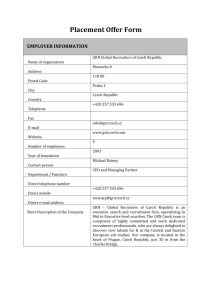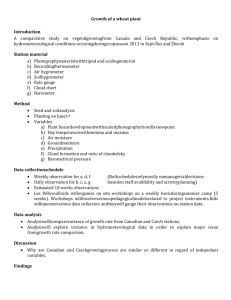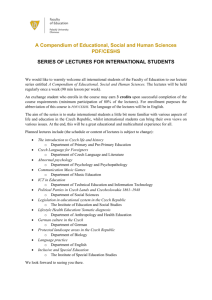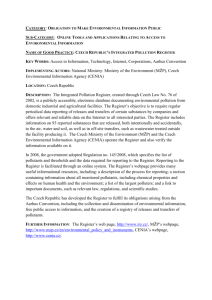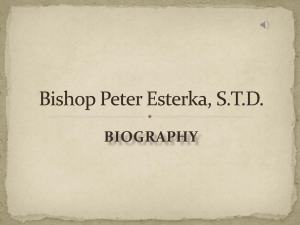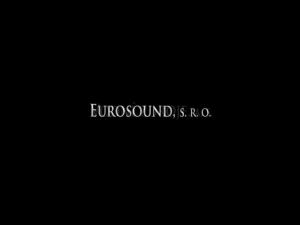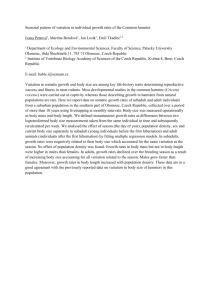Comprehensive Evaluation of International Development
advertisement
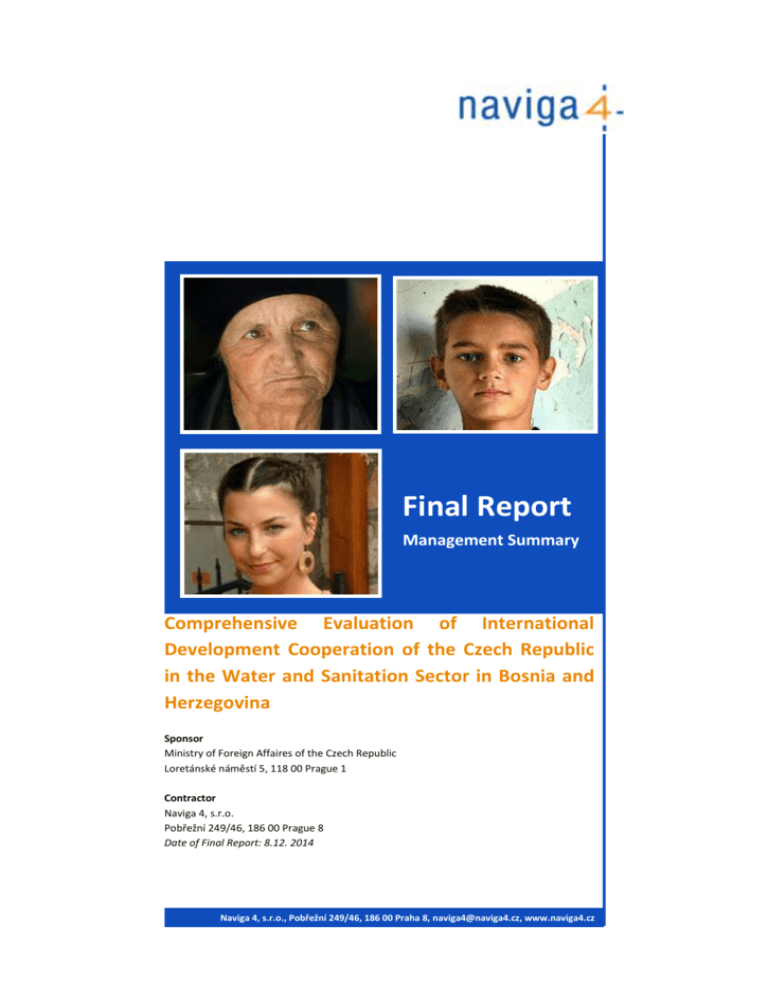
Final Report Management Summary Comprehensive Evaluation of International Development Cooperation of the Czech Republic in the Water and Sanitation Sector in Bosnia and Herzegovina Sponsor Ministry of Foreign Affaires of the Czech Republic Loretánské náměstí 5, 118 00 Prague 1 Contractor Naviga 4, s.r.o. Pobřežní 249/46, 186 00 Prague 8 Date of Final Report: 8.12. 2014 Naviga 4, s.r.o., Pobřežní 249/46, 186 00 Praha 8, naviga4@naviga4.cz, www.naviga4.cz Projekt: Komplexní vyhodnocení zahraniční rozvojové spolupráce České republiky v sektoru vody a sanitace v Bosně a Hercegovině Závěrečná zpráva MANAGEMENT SUMMARY Scope of Evaluation Project “Comprehensive evaluation of international development cooperation of the Czech Republic in the water and sanitation sector in Bosnia and Herzegovina (BiH)” was implemented by the Naviga4 in the period of May to October 2014. The evaluation mission to Bosnia and Herzegovina was conducted between September 22 to October 4, 2014. The dates of the mission and course of evaluation works were affected by the catastrophic floods in Bosnia and Herzegovina from May 2014, which affected directly the project sites concerned. Following the floods, the term of the mission was postponed for three months. General election in BiH, which followed immediately after the mission, formed another factor that affected the availability of stakeholders for evaluators. Together they influenced the concentration of some stakeholders on development cooperation issues and its perceived prioritization and urgency. The evaluation has been was carried out on the basis of three completed projects implemented within the Czech development cooperation: Development of Waste Management in Doboj a Maglaj Region Responsible party: Czech Development Agency Implementing party GEOtest a.s. Year of realization: 2011 – 2013 Budget: 18 mil. Kč Support in Building a Sewerage System and Waste Water Treatment Plant in the Village of Svrake Responsible party: Czech Development Agency Implementing party Hydroprojekt CZ a.s. Year of realization: 2012 Budget: 0,31 mil. Kč (planned allocation 750 000 EUR) Waste Management, Waste Sources, Packaging and Further Manipulation Responsible party: Ministry of Industry and Trade Implementing party VEXIM s.r.o. Year of realization: 2012 Budget: 0,91 mil. Kč The evaluation project has been sponsored by the Ministry of Foreign Affairs of the Czech Republic. The overall objective of the evaluation was to provide substantiated conclusions that can be subsequently used as a basis for future strategic decisions by the key actors in the sector of water and sanitation in Bosnia and Herzegovina. Relevance of the Czech development cooperation ranked as high Activities of the Czech development cooperation focused on improving the situation in the following areas covered in water and sanitation sector: Wastewater management, specifically municipal waste water treatment, solid waste management, specifically municipal waste with an emphasis on mixed municipal waste and its sortable components; further, packaging waste and marginally waste produced from waste water treatment. Activities of the Czech development cooperation focused most of the major needs of Bosnia and Herzegovina in the solid waste management sector: Lack of strategic documents such as waste management plans (WMP) at regional levels, poorly developed institution of "extended producer responsibility", unmet infrastructure needs 2 Projekt: Komplexní vyhodnocení zahraniční rozvojové spolupráce České republiky v sektoru vody a sanitace v Bosně a Hercegovině Závěrečná zpráva in collection, transport, treatment and elimination of waste; weak legal environment, sub-optimal planning and development of strategic infrastructure of the sector (regional landfills). In waste water treatment area the Czech development cooperation also focused on relevant problem, namely inadequate infrastructure for municipal wastewater treatment. Outputs and results of implemented activities are in line with the priorities set by the Strategy of Development Cooperation of the Czech Republic for 20102017 in the field of environmental protection. Relevance of the Czech development cooperation can therefore be regarded as high. Impact of the Czech development cooperation ranked as rather high Development cooperation activities, inter alia, led to the creation of the regional municipal waste management system in the territory of 14 municipalities in the region of Doboj-Maglaj, which represent approximately 10% of the country's population. Following the implementation of the Aid for Trade project, first “authorized packaging company” in Bosnia and Herzegovina (Ekopak) has been established. For packaging waste producers has thus been created a platform for meeting legal obligations to recollect and recycle of packaging waste. The company is legally bound to develop the system of separate collection of waste in municipalities, promote recycling capacities, including the development of systematic education and awareness raising. In wastewater treatment sector the results planned have not been achieved. In the area of solid waste management a systemic and complex approach has been chosen resulting in gradual building a regional waste management system. Conceptual, infrastructural, technological and educational components of the system were supported. The situation in the sector after floods acutely reinforces the need for the construction of regional landfills / dumpsites as the volume of waste deposited significantly increased and the service life of the current landfill further shortened. Impact of the Czech development cooperation can be marked as rather high. Effectiveness of the Czech development cooperation not fully evaluable Activities of the Czech development cooperation are based upon sectoral priorities enshrined in the Strategy of Development Cooperation of the Czech Republic for 2010-2017. Unfortunately, the strategy is not supplemented by more specific strategic implementation framework that would support coherence in selection of funded activities and promoted strategic focus on common objectives and results. Therefore, verification and evaluation of the extent of achievement of objectives at the sector level cannot be done appropriately unless explicitly defined goals and metrics are set. Effectiveness cannot be fully evaluated; nonetheless, priorities of the Strategy have been followed. Efficiency of the Czech development cooperation ranked as rather high Efficiency at the sector level can be defined as choice of solutions in the implementation of projects that lead to systemic improvements and have a complex character, i.e. address all the critical success factors for long term and sustainable improvement in the situation of the target group. Activities of the Czech development cooperation have combined thematic approach (packaging management) and regional approach in this respect. Both strategies lead to results and can be considered synergic, principally. In the solid waste management sector, Czech development cooperation focused on meeting the needs at the conceptual (creating waste management plans, technical documentation and studies), technology and infrastructure level, and complementarily - necessary educational and awareness raising measures. Systemic nature of implemented activities consisted in meeting the needs at levels of collection, removal, treatment and final neutralization of waste, including conditions for further development of supported activities and territory. 3 Projekt: Komplexní vyhodnocení zahraniční rozvojové spolupráce České republiky v sektoru vody a sanitace v Bosně a Hercegovině Závěrečná zpráva In the area of municipal wastewater treatment, evaluator concluded that intentions of expansion and / or modification of existing infrastructures should be considered an alternative approach. If the allocated funds do not allow the realization of complex construction project of sewerage and sewage treatment plant at a significant source of pollution (taking into account the total scale of the problems – ca. 10 000 inhabitants and more). For instance, mere reconstruction of waste water treatment plant (WWTP) at a similarly significant source of pollution, where there is a sewer system, but the existing WWTP proven technology does not provide a contemporary standard of wastewater treatment can represent more efficient solution. The effectiveness of the development cooperation sector can be ranked rather high. Sustainability of the Czech development cooperation ranked as rather high Systemic solution represents also the prerequisite for sustainability of activities. The evaluator verified the existence of the prerequisites for ensuring the sustainability of supported activities. Realized awareness campaigns in area of sorting and separate waste collection at schools produce results after funding has been ended. Nevertheless, efforts in building regional waste management system must be completed by actual construction of landfill, according to current environmental standards. Floods further accentuated the need, while temporarily shifted the priorities of relevant actors to post-flood reconstruction. Sustainability of Czech development cooperation can be considered rather high even in the field of packaging waste. Involvement of packaging waste producers following the Czech model is also addressing the sustainability of the project outputs. The complexity of the solutions supported has emerged as a key factor and prerequisite for efficiency and sustainability. If complex solutions are not addressed directly through the Czech development cooperation activities, it should be then provided for example in the form of complementarity with the activities of other actors in development cooperation. The evaluator recommended to monitor the forthcoming program of the agency SIDA in waste management, as the biggest donor in the sector of solid waste management in Bosnia and Herzegovina. Unmet needs and potential for further cooperation Unmet needs in the sector of solid waste management in Bosnia and Herzegovina include: management of hazardous waste from municipal sources, planning and infrastructure development for material and energy use of waste, central monitoring and reporting system, extending the scope of material flows within the Institute of extended producer responsibility (batteries, tires, waste from electrical and electronic equipment used mineral oils, etc.) Infrastructure and technological needs result from the waste management plans of individual municipalities, generally involve collecting trucks, compactors, containers, containers, sorting lines presses, mechanical-biological treatment of waste, composting). 4 Projekt: Komplexní vyhodnocení zahraniční rozvojové spolupráce České republiky v sektoru vody a sanitace v Bosně a Hercegovině Závěrečná zpráva Recommendations of the evaluator According to the focus of the future Czech development cooperation, the evaluator identified following key recommendations: Recommendations Resume / follow up on activities leading to the creation of policy documents in the area of waste management at municipal level Approved waste management plans constitute a prerequisite for building functional, sustainable regional waste management system. Plans can clearly define technological and investment needs and thus create a basement level for complementary action of various financial donors and other stakeholders in waste management development. Establish and promote activities in the field of environmental education and awareness raising especially those that are complementary to infrastructure projects Education, awareness raising and motivation of the local population creates a prerequisite for the sustainability of activities / projects regarding the efficiency of charges and thus sustainability of operational financing of municipal enterprises. Focus on solutions of components, that remain systematically unsolved components of municipal waste such as hazardous waste Management of hazardous waste constituents is not systematically addressed and solved at the level of municipal waste management systems. Usually hazardous waste is not collected separately and ends on unsecured landfills. Focus on the missing infrastructure key elements in the partial material waste management streams according to the specific needs of the local or regional entities, enacted in the waste management plan Coordinate activities in the sector with other donors, among, following the evaluation of the program SIDA (Municipal Programme for Solid Waste Management in Bosnia and Herzegovina 2010-2014) Over a long period SIDA is a key actor in the field of waste management in BiH. Following the "Results Strategy for Sweden's reform cooperation with Eastern Europe, the Western Balkans and Turkey 2014-2020" a set of thematic and territorial priorities is going to be developed, which may provide a framework for complementary action of the Czech development cooperation. In the case of projects proposal focused on municipal wastewater treatment, it is suitable to consider the efficiency of expenditures related to the overall impact on the extent of the problem and needs of the sector (value for money) For example by prioritizing the modernization and reconstruction of existing infrastructure instead of building new wastewater treatment infrastructure. Develop conceptual / strategic framework of future Czech development cooperation engagement in the water and sanitation sector in Bosnia and Herzegovina A comprehensive evaluation of Czech development cooperation in the sector requires (primarily) defining of objectives and indicators to measure level of achievement. Only under this condition it is possible to analyze and address the issues of the achievement of the objectives. Objectives and indicators established in the strategy should be formulated for the subsectors separately 5 Addressee ČRA Severity rating Medium ČRA (Contractors) Medium ČRA Medium ČRA Medium ČRA Medium ČRA Medium MZV / ČRA High

